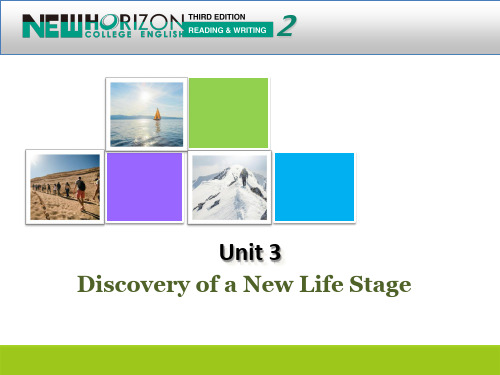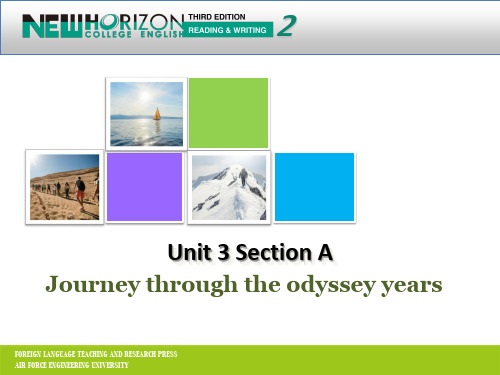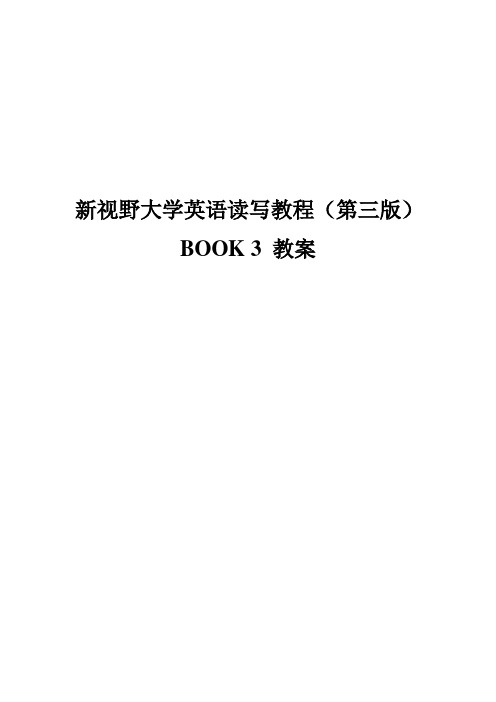新视野大学英语(第三版)读写教程Book2-Unit3-电子教案
- 格式:doc
- 大小:134.00 KB
- 文档页数:6





新视野大学英语读写教程(第三版)BOOK 3 教案UNIT3Life stories___________________ PART lUNDERSTANDING AND LEARNINGOverview________________________________________ Movies play an important role in almost everyone’s life. People from the movie industry have considerable influence on the masses. They exhibit personality traits that deserve admiration and applause, and could be looked up to as role models. This unit will fully explore their best qualities.The two texts in the current unit are biographies, a genre of literature, which is a written account of another person’s life. Each of the texts narrates, analyzes and interprets the most important facts of one prominent figure in the movie domain. Text A pays attention to actress Audrey Hepburn’s noble endeavor and her contribution to the cause of UNICEF, while Text B portrays the determination and fervent spirit of director and producer Steven Spielberg.The teacher can make students do additional research at the library, or Audrey Hepburn and Steven Spielberg in advance. Then in the classroom, the teacher may organize a variety of activities including pair work, group discussion, and mini-survey to talk about the films or the issue of fame, fortune, and social responsibility.Section A_________________________________________________ Audrey Hepburn-A true angel in this world1 Audrey HepburnAudrey Hepburn (1929-1993) was a slender, stylish motion picture actress known for her radiant beauty, her ability to project an air of sophistication tempered by a charming innocence, and her tireless efforts to aid needy children.Although born in Belgium, Hepburn had British citizenship through her father and attended school in England as a child. In 1939, however, at the onset of World War II, her mother(Hepburn’s father left the family when she was six years old) moved the child to the Netherlands (where the author of this text mistakenly considered Hepburn was born), thinking the neutral country safer than England. Throughout World War II, Hepburn endured hardships in Nazi-occupied Holland. She still managed, however, to attend school and take ballet lessons. After the war, she continued to study ballet in Amsterdam and in London. During her early 20s, she studied acting and worked as a model and dancer. After appearing in several British films and starring in the 1951 Broadway play Gigi (《琪琪》), Hepburn gained instant Hollywood stardom for playing the Academy Award-winning lead role in Roman Holiday. She remains one of few entertainers who have won Academy, Emmy, Grammy, and Tony Awards. Hepburn’s war-time struggles inspired her passion for humanitarian work. She devoted much of her later life to UNICEF, visiting famine-stricken villages, in Latin America, Africa, until shortly before her death of cancer in 1993. She was awarded the Presidential Medal of Freedom in recognition of her work as a UNICEF Goodwill Ambassador in 1992.2 UNICEFUNICEF (United Nations International Children’s Emergency Fund) was created by the United Nations General Assembly on December 11, 1946, to provide emergency food and healthcare to children in countries that had been devastated by World War II. After 1950 the fund directed its efforts toward general programs for the improvement of children’s welfare, particularly in less-developed countries and in various emergency situations. The organization’s broader mission was reflected in the name it adopted in 1953, the United Nations Children’s Fund, but it has continued to be known by the popular acronym based on this old name. Headquartered in New York City, UNICEF provides long-term humanitarian and developmental assistance to children and mothers in developing countries. UNICEF’s programs emphasize developing community-level services to promote the health and well-being of children.3 UNICEF Ambassador of GoodwillMany celebrities have acted as international, regional or national ambassadors, depending on their profile, interests, and desired level of responsibility. The role of Goodwill Ambassador allows celebrities with a demonstrated interest in UNICEF issues to use their fame to draw attention to important issues. This may take the formof public appearances and talks, visits to troubled regions, and use of their political access to advocate UNICEF causes, all of which have the power to draw attention from the media and to create public awareness.4 Gregory PeckGregory Peck (1916-2003) was one of the world’s most popular film stars from the 1940s to the 1960s. He is best known for his performance in the 1962 film To Kill a Mockingbird, which earned him the Academy Award for Best Actor.In 1967 Peck received the Academy’s Jean Hersholt Humanitarian Award. He was also in 1969 for his lifetime humanitarian effort. Always politically progressive, Peck was active in such causes as anti-war protests, workers’ rights and civil rights.5 Billy WilderBilly Wilder (1906-2002) was an Austrian-born American filmmaker, screenwriter, producer artist, and journalist. His career spanned more than 50 years and 60 films. He is regarded as one of the most brilliant and versatile filmmakers of Hollywood’s golden age. During his career, Wilder gained 20 Academy Award nominations and won six Oscars. He received a lifetime achievement award from the American Film Institute in 1986.6 Academy AwardsAn Academy Award (byname Oscar) is an award presented annually by the American Academy of Motion Picture Arts and Science to recognize excellence of professionals in the film industry, including directors , actors , and writers. The award ceremony is one of the most prominent award ceremonies in the world, and is televised live in more than 200 countries annually.7 Hubert de GivenchyHubert de Givenchy (1927-,) is a French aristocrat and fashion designer who founder The House of Givenchy in 1952. He is famous for having designed much of the personal and professional wardrobe of Audrey Hepburn, as well as clothing for clients such as Jacqueline Kennedy. He was named to the International Best Dress List Hall of Fame in 1970.Detailed study of the text1 Audrey Hepburn thrilled audiences with starring roles in noteworthy films... (Para.1)Meaning: Audrey Hepburn played leading roles in many extraordinary films, and such poles gave great pleasure to the people who watched the films…★noteworthy: a. important or interesting enough to deserve your attention 值得注意的;显著的One of the most noteworthy trends in contemporary American higher education is the tendency among community colleges to offer certificate programs besides the traditional associate degrees.当代美国高等教育最显著的趋势之一就是社区大学除了授予传统的副学士学位,还开设学历课程。

新视野大学英语2第三版读写教程Unit31. Unit3概述本单元主要介绍了如何在商务场景中进行有效的沟通,包括商务会议、商务函电、商务策划等方面。
通过学习本单元的内容,可以提高学生的商务英语表达能力,为将来的职业发展打下基础。
2. Unit3课前准备在学习本单元之前,建议学生先进行以下准备工作:1.预习教材,了解本单元的主要内容和重点词汇。
2.复习前两个单元的知识点,巩固基础。
3.预先收集一些商务英语的素材,如商务会议的案例、商务函电的范例等。
3. Unit3课堂学习3.1 主要知识点本单元的主要知识点包括:•商务会议的基本用语和表达方式•商务函电的写作规范和格式1•商务策划的步骤和技巧3.2 学习活动建议为了帮助学生更好地掌握本单元的知识点,可以进行以下学习活动:1.角色扮演:安排学生分成小组,模拟商务会议的场景,通过角色扮演来练习商务会议的表达方式。
2.商务函电写作:让学生针对不同的商务情景,撰写商务函电,同时教授他们写作的规范和格式要求。
3.商务策划小组讨论:将学生分成小组,让他们共同策划一个商务活动,并在课堂上进行展示和讨论,提高他们的商务策划能力。
4. Unit3课后作业为了巩固和运用所学的知识,建议学生完成以下课后作业:1.完成课本上的练习题,检查自己的学习成果。
2.阅读相关的商务英语文章,扩展词汇量和阅读理解能力。
3.自行选择一个商务场景,模拟商务会议并记录相关表达方式。
5. Unit3学习资源推荐为了帮助学生更好地学习本单元的内容,推荐以下学习资源:1.教材:《新视野大学英语2第三版读写教程》第三单元。
22.网络资源:可以通过搜索引擎来查找相关的商务英语学习资料和案例分析。
3.社交媒体:关注一些商务英语学习的社交媒体账号,获取最新的学习资源和商务英语相关信息。
6. Unit3学习评估方式为了评估学生对本单元知识的掌握程度,可以采用以下评估方式:1.随堂测试:在课堂上进行一些简答题或选择题的测试,考察学生的基础知识。
新视野大学英语读写教程(第三版)BOOK 3 教案章节Unit One: The Way to SuccessSection A: New Words and Expressions教案内容Text: Never, ever give up!Exercises: Vocabulary, Sentence Structure,Translation Listening, Speaking & Writing Skills教案目的1.To talk about the secret of success。
2. To further understand the text。
3.To apply the phrases and patterns。
4.To master the essay writing skill。
1. Clearly know the structure of the passage。
2. Master the important language points。
教案要求3.Briefly summarize the passage alone。
4.Correctly use and master the key words in this unit.重点难点1.The structure of the whole passagediscussed and the writing waysmentioned in this passage2.The reading skills mentioned in this unit3.listening practicing related to the contents learned in this unit1.The use of the new words and phrases in this passage2.The writing ways mentioned in this passage3.Some important sentence structures课堂设计Step 1: Lead-in10m Questioning&The Discussing Questioning&First Step 2: Pre-reading Activities10m DiscussingTwoLecturing,PeriodsStep 3: New Words80m Questioning&Giving Examples The Step 1: Background Information10m Questioning& Second DiscussingTwo Step 2: Structure Analysis10m LecturingPeriodsLecturing, Step 3: Language points and Difficult70m Questioning&SentencesGiving ExamplesStep 4: Comprehension of the Text A10m Questioning&DiscussingStep 1: Summarize the passage orally20m Questioning& DiscussingTheStep 2:Exercises (Words in use, WordThird Questioning& building,Banked cloze, Expressions in use,70mTwoTranslation in Section A)DiscussingPeriodsLecturing, Step 3: Revision & Homework10m QuestioningStep 1: Check Homework30m QuestioningTheStep 2:Structured Writing30m Watching &Forth DiscussingTwoStep 3: Listening20m Listening &Periods QuestioningStep 4: Speaking20m Questioning & Discussing教学过程The First Two Periods:Step 1: Lead-in:1.What is success?2.What do you think are the secrets of success?Step 2: Pre-reading Activities:1. Listen to a talk about steps to make your dreams come true. Fill in the blanksbased on what you hear.2. Listen to the talk again and discuss the following questions.Step 3: New WordsThe Second Two Periods:Step 1: Background Information1. Public schools in the UK & US2. Winston ChurchillStep 2: Structure AnalysisPart I (Paras.1-2): By using Winston Churchill’ s story and his speech at Harrow as anintroduction to the topic, the text makes clear its statement: thesecret of success is“ Never give up”.Part II (Paras.3-7): Through the examples of world famous scientists, statesman, andjurist, the text brings forward the statement that only those with astrong will , those who“ keep their eyes on the prize” , and those whoexpend the substantial effort to keep going, will finally succeed.Part III (Paras 8): By reinforcing the statement given in part II, the text draws theconclusion that with hard work, determination, dedication andpreparation, you can transcend any handicap, accomplish any feat,and achieve success.Step 3: Language points and Difficult SentencesPractical Phrases1. deviate from ⋯偏离,背离⋯⋯2. preclude sb. from doing阻止某⋯人做⋯⋯3. triumph over战胜⋯⋯⋯4. in (the) pursuit of追⋯求⋯⋯5. work one’ s 。
Book 2 Unit 3 Journey through the odyssey years奥德赛岁月之旅Most of us know about the phases of life which we label to parallel different age groups and life stages: childhood, adolescence, adulthood, and old age. We think of infancy before childhood and middle age before old age, with each unique phase bringing its own peculiar set of challenges. These challenges can be overcome by acquainting ourselves with them, such as the child's need to learn, the adult's need to find the right career and build a family, and the senior's need for support and good health care.我们大多数人都知道,根据不同的年龄和生活阶段,人生可与此平行划分为童年、青春期、成年和老年这四个阶段。
我们把这些阶段想象为婴儿期在童年之前,中年在老年之前,每个阶段都会面临一系列特有的挑战,如孩子对学习的需要,成人对找到合适的职业生涯和建立一个家庭的需要,以及年长者对得到帮助和良好医疗保健的需要。
通过对它们的充分了解,我们就可以战胜这些挑战。
Interestingly, ideas about the stages of life are changing.有趣的是,关于人生阶段的观念正在发生变化。
新视野大学英语读写教程(第三版)BOOK 2 教案教学对象Teaching Subjects 周次课型课时分配教学目标Teaching Aims重点Key Issues教学内容Unit 1 An Impressive English 2015 级大学英语本科LessonLesson Content第 2-4周授课时间2月 29日 -3月 18日□ 理论课√ 理论、实践课□ 实践课教学环境6Teaching多媒体教室EnvironmentAfter studying this unit, the students are expected to be able to:1.understand the main idea and structure of Section A and Section B ;2.master the key language points and grammatical structures in the texts3.talk about language teaching and learning and express their opinions about current way ofteaching in an English class;4. read with the skill finding key― ideas in sentences ‖;5.write a composition with three main parts: introduction, body and conclusion.1.Vocabularytedious absorbed allergic capture condense exceed distinguish distinctive complimentary complementary proclaim evidently adequate competent adjust beneficial2. Skills●Learn to read with the skill ―finding key ideas in sentences‖and write a composition withthree main parts: introduction, body and conclusion.难点● To talk aboutlanguage teaching and learningPotential Problems●write a composition with three main parts: introduction, body and conclusion.and Difficulties● To apply the phrases andpatternsA combination of traditional teaching methods with the communicative approach will beadopted. Special attention should be paid to classroom interaction like questioning and 教学方法answers. Small group works are always needed while discussing the questions and the Methodologydifficult translation practice. More encouragement is needed and more guidance will begiven in their extracurricular study.教具Teaching Visual aids, projector, stereo and microphoneAids教学分组Teaching Group work and pair workGroups课堂学习任务与活动的组织Conduct of Tasks and Activities(师生互动方式Mode of Interaction;学习策略Learning Strategies)Students-centeredTask-based teaching and learning教学过程设计Teaching Procedures步骤 1 Step 1导入Lead-inI.Greeting and warming-up questions discussion.1.What are the key factors that help people learn English as a foreign language?2.Do you have any problem in English learning?3.Do you think grammar is important in English learning?II.Listening and discussing.1.Listening practice.2.In your opinion, what is the most effective way to learn English?III.Listening to a talk and answer questions on page 2步骤 2 Step 2 课文学习Section A An Impressive English LessonI. New words1. tedious: a. boring and continuing for too long冗长乏味的Telling the story has become tedious, as I have done it so many times.讲述这个故事已变得单调乏味,因为我已经讲了这么多次了。
新视野大学英语(第三版)读写教程B o o k2-U n i t3-电子教案
-CAL-FENGHAI-(2020YEAR-YICAI)_JINGBIAN
Unit 3 A Successful Career Teaching Focus
Teaching Plan
Leading In and Exploring the Topic
Divide the class into groups of four and allow the Ss 5
minutes to finish the exercise in Exploring the Topic.
Give the Ss 5 minutes to discuss the following two questions:
1) What do you intend to choose as a career in the future
and why
2) How will you prepare yourself for your future career?
Ask some volunteers to share their answers to the above
question with the class.
Section A Reading Through
Ask Ss to go through Text A quickly and then finish the
exercise of Getting the Message on P44 of SB.
Check the understanding by eliciting answers from some
students.
Highlight some difficult sentences and elicit explanations
from students and give helps where necessary.
Allow the Ss 3 minutes to write down a sentence showing he or she has learned from the story. Give the Ss some sentence structures to help them write longer sentences.
Ask some students to share their sentences with the class. Basic Writing Skills
Prepare a PPT with the exercise on P48 of SB.
Ask some students to tell their choices to the class and
explain why they have those choices.
Analyze the keys to those choices by explaining the rules of shifts in tense listed on P47-48.
Section B Reading More
Before class, divide the class into 6 groups and ask each
group to prepare a 5-minute PPT which shows the group’s
understanding of the following 6 sentences in the text:
1) Believe in yourself.
2) Just get it done, even if it isn’t perfect.
3) Stick to your vision despite opposing voices.
4) Loyalty breeds success.
5) Live below your means.
6) Follow your passion, not the money.
In class, give each group 5 minutes to display the PPT. Give
them help where necessary.
Make sure every member of the group do some work either
in making the PPT before class or in the presenting of the PPT
in class.
Section C Practical Writing
Guide the students to finish the two exercises on P56 to P57
of SB according to the samples given.
Ask each student to design a visa application form for
themselves.
Finish all the exercises in Unit Three.
Read the passage in Reading Out on Page 43 of SB and recite it.
Write a diary of your thoughts about your opinion of success and what you wish to do as a career in the future.
Contribute to teamwork of the PPT about Text B and help your group member whenever you can.
Design a visa application form for yourself.。